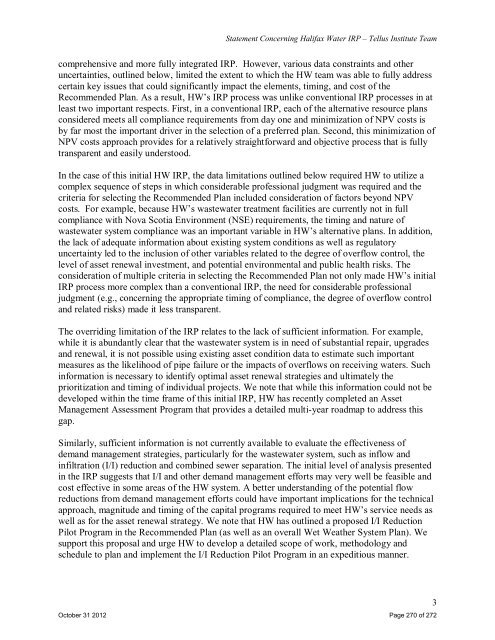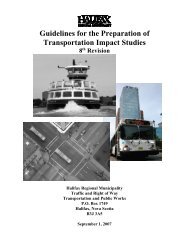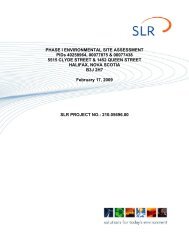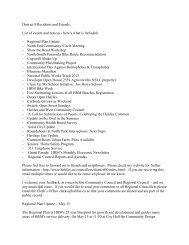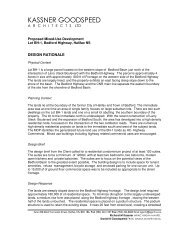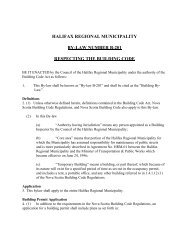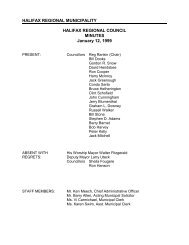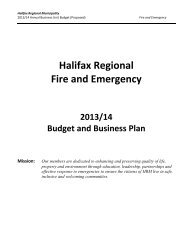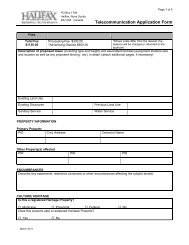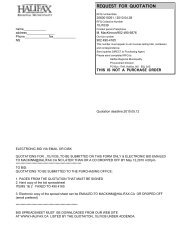volume 1 - Halifax Regional Municipality
volume 1 - Halifax Regional Municipality
volume 1 - Halifax Regional Municipality
You also want an ePaper? Increase the reach of your titles
YUMPU automatically turns print PDFs into web optimized ePapers that Google loves.
Statement Concerning <strong>Halifax</strong> Water IRP – Tellus Institute Team<br />
comprehensive and more fully integrated IRP. However, various data constraints and other<br />
uncertainties, outlined below, limited the extent to which the HW team was able to fully address<br />
certain key issues that could significantly impact the elements, timing, and cost of the<br />
Recommended Plan. As a result, HW’s IRP process was unlike conventional IRP processes in at<br />
least two important respects. First, in a conventional IRP, each of the alternative resource plans<br />
considered meets all compliance requirements from day one and minimization of NPV costs is<br />
by far most the important driver in the selection of a preferred plan. Second, this minimization of<br />
NPV costs approach provides for a relatively straightforward and objective process that is fully<br />
transparent and easily understood.<br />
In the case of this initial HW IRP, the data limitations outlined below required HW to utilize a<br />
complex sequence of steps in which considerable professional judgment was required and the<br />
criteria for selecting the Recommended Plan included consideration of factors beyond NPV<br />
costs. For example, because HW’s wastewater treatment facilities are currently not in full<br />
compliance with Nova Scotia Environment (NSE) requirements, the timing and nature of<br />
wastewater system compliance was an important variable in HW’s alternative plans. In addition,<br />
the lack of adequate information about existing system conditions as well as regulatory<br />
uncertainty led to the inclusion of other variables related to the degree of overflow control, the<br />
level of asset renewal investment, and potential environmental and public health risks. The<br />
consideration of multiple criteria in selecting the Recommended Plan not only made HW’s initial<br />
IRP process more complex than a conventional IRP, the need for considerable professional<br />
judgment (e.g., concerning the appropriate timing of compliance, the degree of overflow control<br />
and related risks) made it less transparent.<br />
The overriding limitation of the IRP relates to the lack of sufficient information. For example,<br />
while it is abundantly clear that the wastewater system is in need of substantial repair, upgrades<br />
and renewal, it is not possible using existing asset condition data to estimate such important<br />
measures as the likelihood of pipe failure or the impacts of overflows on receiving waters. Such<br />
information is necessary to identify optimal asset renewal strategies and ultimately the<br />
prioritization and timing of individual projects. We note that while this information could not be<br />
developed within the time frame of this initial IRP, HW has recently completed an Asset<br />
Management Assessment Program that provides a detailed multi-year roadmap to address this<br />
gap.<br />
Similarly, sufficient information is not currently available to evaluate the effectiveness of<br />
demand management strategies, particularly for the wastewater system, such as inflow and<br />
infiltration (I/I) reduction and combined sewer separation. The initial level of analysis presented<br />
in the IRP suggests that I/I and other demand management efforts may very well be feasible and<br />
cost effective in some areas of the HW system. A better understanding of the potential flow<br />
reductions from demand management efforts could have important implications for the technical<br />
approach, magnitude and timing of the capital programs required to meet HW’s service needs as<br />
well as for the asset renewal strategy. We note that HW has outlined a proposed I/I Reduction<br />
Pilot Program in the Recommended Plan (as well as an overall Wet Weather System Plan). We<br />
support this proposal and urge HW to develop a detailed scope of work, methodology and<br />
schedule to plan and implement the I/I Reduction Pilot Program in an expeditious manner.<br />
October 31 2012 Page 270 of 272<br />
3


